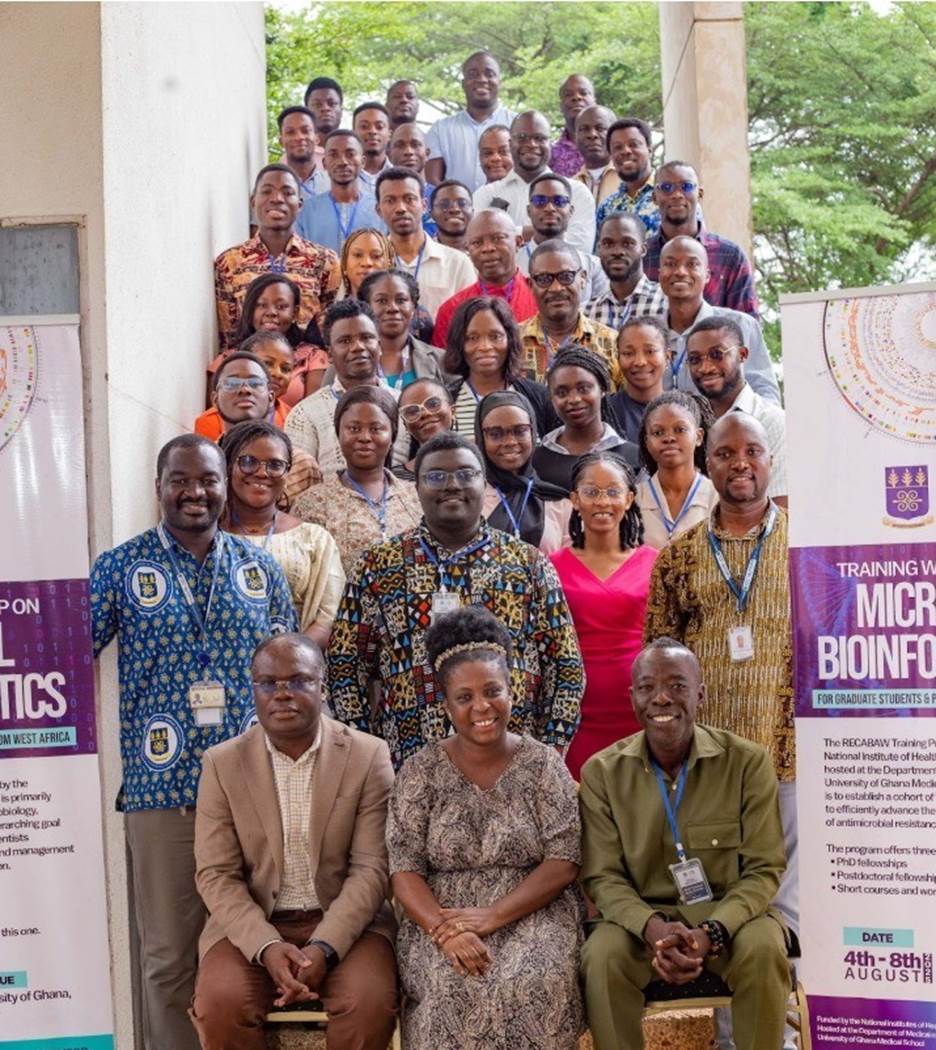Twin Training Workshops in Microbial Diagnostics and Bioinformatics Held

Two NIH-funded training programmes at the Department of Medical Microbiology, University of Ghana Medical School, recently organised hands-on workshops to strengthen regional capacity in microbial diagnostics and bioinformatics.
The “Research and Capacity Building in Antimicrobial Resistance in West Africa” (RECABAW) Training Programme held a one-week course in Microbial Bioinformatics during the period August 4 to 8, 2025, while the “Application of Data Science to Build Capacity in Zoonoses and Foodborne Infections in West Africa” (DS-ZOOFOOD) Training Programme hosted a parallel workshop in Microbial Diagnostics from July 28 to August 1, 2025.
The RECABAW bioinformatics workshop offered intensive, hands-on training that guided participants from basic computer and UNIX command-line skills through various stages of genome analysis.
Sessions covered concepts such as whole-genome sequencing, genomic data quality control, read mapping, variant calling, genome assembly, annotation and the use of modern workflow tools.
Participants learned to use online bacterial-genome analysis platforms to screen for antimicrobial resistance and plasmid genes, and they received training in phylogenetics, including creating and interpreting phylogenetic trees. The course concluded with group capstone presentations based on real microbial datasets, demonstrating the practical outcomes of the workshop.
Alongside this was the DS-ZOOFOOD microbial diagnostics workshop, which was laboratory-focused and held at the well-equipped teaching and research facilities of the Department of Medical Microbiology. Participants received training in RT-qPCR assays, with particular emphasis on the molecular bacterial load assay (MBLA) for tuberculosis.

The programme covered RNA extraction, DNA removal, primer and probe design, standard curve preparation, duplex qPCR, assay specificity testing, data interpretation and group presentations of in-silico and laboratory results. Additional seminars introduced participants to key microbiological and translational applications.
The workshops were led by experts from the University of St. Andrews in the United Kingdom and the University of Ghana. Participants came from all over West Africa, including Ghana, Nigeria, Togo, Senegal, Benin, Sierra Leone, Liberia, and Burkina Faso, helping to promote regional collaboration and knowledge sharing among early-career scientists.
The two training programs (RECABAW and DS-ZOOFOOD) previously held training workshops in December 2025. The RECABAW Training Programme led a biostatistics clinic that offered practical guidance in data handling, analysis and visualization, while the DS-ZOOFOOD Training Programme provided a course in infectious disease modeling, introducing mathematical and computational methods used to study disease dynamics.
Commenting on the initiatives, Professor Eric Sampane-Donkor, the Principal Investigator and Programme Director for both training programs, noted that the workshops represent a significant step toward enhancing sustainable scientific capacity across the sub-region. He emphasised that the programmes not only provide young scientists with technical and analytical skills related to microbial genomics and diagnostics but also foster collaboration and leadership in efforts to lessen the burden of infectious diseases in West Africa.